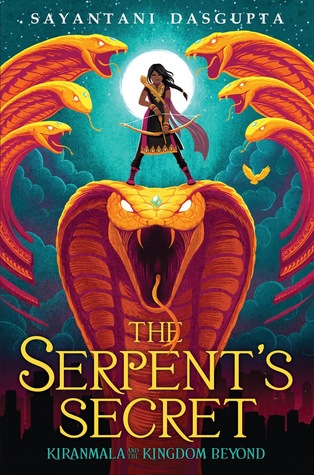Hello bookworms. First of all, to all my fellow tamil and Sri Lankan readers, happy new year!
Today, I am extremely excited about the post I have for you all. We have a guest post by the amazing Sayantani Dasgupta, author of The Serpent's Secret, a fabulous desi MG which is hands down one of the most exciting 2018 books. Moreover, I am even more excited about what the guest post is about, it's a topic that I myself have always had strong feelings for - the blurred lines between mythology, history, religion and folktales when it comes to talking about culturally diverse books, especially but not limited, to desi books.
The
first time I heard someone describing my middle grade fantasy
novel, The Serpent’s Secret (Scholastic, February 2018), as based on Indian myths, I
reacted badly. “No, I based the story on Bengali
folktales,” I immediately corrected. My frustration was met with confusion.
“Isn’t that what I said?”
But
folktales about tricksters and heroes are not the same as myths about gods and
goddesses (think Jack and the Beanstalk vs. Zeus and Osiris), and regional
tales enjoyed by communities of various faiths are not the same as religiously
based stories. These distinctions are particularly important for those of us of
South Asian heritage in the subcontinent and throughout the diaspora,
particularly those of us who seek to resist divides along religious lines, and
celebrate our common Desi histories.
As an
Indian immigrant daughter growing up in the U.S., my connection to my heritage
was mediated by stories. Of course, there were the fantastic folk stories my grandmothers
told me that inspired The Serpent’s
Secret, stories filled with flesh eating rakkhosh, evil serpents, brave
princes and princesses, and wise cracking birds. But there were other stories
too. My maternal grandfather, who was jailed at age 15 as a freedom fighter by
the British due to his participation in the Chittagong Armory Raid (an area now
in Bangladesh), told me of the pride he took in being a secular Indian, someone
who put the dream of a self-reliant and self-governing homeland far above
religion. In addition, although my parents were born in India, both of their
families were originally “from that other shore” – from what is now Bangladesh
– and so there were stories about that history too, what life was like under
British rule in Dhaka, Chittagong, and Burma (now Myanmar). I heard stories
about a time when people of multiple faiths lived happily and peacefully as
friends and neighbors. And then of course, I heard stories about Partition, the
splitting of Bengal in two (into the Indian state of West Bengal and the
country of East Pakistan – which later became Bangladesh) and the terrible
communal violence thereafter.
The 1947
Partition of South Asia has been called by writer William Dalrymple as “central to modern identity in the
Indian subcontinent, as the Holocaust is to identity among Jews, branded
painfully onto the regional consciousness by memories of almost unimaginable
violence.” It is a historical event that casts
its shadow upon us even today, causing rifts between South Asians of different
faiths, encouraging our antagonisms as if they were pre-ordained and
inevitable.
Yet, most of the Bengali stories I drew from to write The Serpent’s Secret are from a pre-partition
history. These are folk stories that are still very much enjoyed by
Bengali-speaking Indians and Bangladeshis, by Muslims, Hindus, Buddhists,
Christians, and any other faith. Of course, I fully acknowledge that these
stories are interpreted through my own particular lens and my own particular
identities. But to gloss over that shared heritage – to claim that Bengali folk
stories are unique to Indians or particular to Hindus – is to commit a type of
cultural violence that I utterly and categorically resist. These rich stories
belong to all of us of Bengali heritage, not just some; they unite us in our
shared history. (I mean, what better unifier of people of multiple nations and
faiths than a cannibalistic, drooling, rhyming rakkhosh demon?)
The Serpent’s Secret is a fun and fast paced fantasy
adventure about a 12 year old girl from New Jersey who must return to her
parents’ homeland (“The Kingdom Beyond Seven Oceans and Thirteen Rivers” – the make-believe
land that most Bengali folktales take place) to fight demons and monsters, while
finding out the truth about her own strength and her own origins. In the
process of publishing it, I, as its author, have had to re-discover and
re-articulate the strength of my own beliefs; I have had to resist convenient
national or religious categories, and remember with joy the words of the
Bangladesh national anthem, written by Nobel Laureate Rabindranath Tagore: “My
golden Bengal, I love you. All my days, your skies, your breeze set my heart’s
flute to sing.”
Title : The Serpent's Secret
Author : Sayantani Dasgupta
Publisher : Scholastic
Release Date : February 27th 2018
Synopsis :
MEET KIRANMALA: INTERDIMENSIONAL DEMONSLAYER
(But she doesn’t know it yet.)
On the morning of her twelfth birthday, Kiranmala is just a
regular sixth grader living in Parsippany, New Jersey… until her parents
mysteriously vanish later that day and a rakkhosh demon slams through her
kitchen, determined to eat her alive. Turns out there might be some truth to
her parents’ fantastical stories—like how Kiranmala is a real Indian
princess—and a wealth of secrets about her origin they've kept hidden.
To complicate matters, two crushworthy Indian princes ring
her doorbell, insisting they’re here to rescue her. Suddenly, Kiran is swept
into another dimension full of magic, winged horses, moving maps, and annoying,
talking birds. There she must solve riddles and slay demons all while avoiding
the Serpent King of the underworld (who may or may not want to kill her) and
the rakkhosh queen (who definitely does) in order to find her parents and
basically save New Jersey, her entire world, and everything beyond it…


No comments:
Post a Comment